
People with curly hair often notice that using gel-type styling products causes their scalps to flake, making it essential to understand what causes it so you can address any flakes adequately.
If the flakes appear either seasonally or year-round, they could indicate a medical condition like psoriasis or seborrheic dermatitis; your doctor can diagnose and provide appropriate treatment.
Dandruff
Dandruff is a common condition characterized by itchy, flaky skin on the scalp and shoulders that isn’t contagious; instead, it usually indicates a scalp issue that can be easily treated using over-the-counter (OTC) shampoo products.
Dandruff can often be caused by an overgrowth of Malassezia globosa fungus, which feeds off oils that come from your scalp to produce an acid known as oleic acid that stimulates your body to rapidly shed skin cells in large clumps and visible as flakes.
Using a shampoo with ingredients such as pyrithione zinc, salicylic acid, selenium sulfide, or ketoconazole regularly is often enough to eliminate dandruff caused by oily and skin cell build-up. In addition, hair products with alcohol or bleach should be avoided since these can dry out your scalp further; spend some time outside each day in sunlight, which will also help moisturize it further.
Product Build-Up
Most hair products contain ingredients that form a coating over your locks, such as silicones, mineral oils, waxes, and butter. This coating protects your tresses from heat, dust, dry weather, and UV rays while not washing away quickly in the shower; over time, these build up layers that cling tightly onto hair strands, restricting moisture absorption by conditioners that would generally penetrate it deeper into its core.
Build-up can be hard to miss as it resembles dandruff in its appearance and feel. Running your fingers through your hair will reveal it, as it feels sticky or clunky when running them through, which prevents the free movement of hair strands. This occurs due to product accumulation clogging up scalp pores; clarifying will help avoid this scenario and protect your scalp.
Scalp Irritation
Haircare products such as gels can irritate the scalp and result in visible white flakes in your hair, which shed skin cells trapped between hair strands. Choosing gentle products free from chemical irritants and fragrances to minimize irritation could provide relief.
Stress may also contribute to scalp irritation. According to dermatologists, stress can put undue strain on our bodies and lead to dry flakey scalps and itchy locks. To alleviate the itching sensations caused by this irritation, clarifying shampoo or scalp treatments like our Scalp Advanced Anti-Dandruff Dermo-Clarifier Shampoo or our Intense Soother Treatment can calm skin irritations.
Trying over-the-counter treatments might not help; in such cases, seeking advice from healthcare providers may provide ways to manage whatever condition is causing the flaky scalp. Once diagnosed, treatment will be found that will address it directly, giving you a fresh start with loving your hair again!
Seborrheic Dermatitis
Red, oily skin with flaky scales that cover both the scalp and areas where oil glands are concentrated, such as eyebrows, ears, nose, groin, arms, chest, and thighs, is characteristic of seborrheic dermatitis, often worsened during colder weather or emotional stress or menstruation.
Furthermore, this condition often runs in families, while certain medical conditions like Parkinson’s disease or HIV increase its risk. Anti-dandruff shampoos or medicated cleansers and creams prescribed by your physician should help to alleviate your condition, often including antifungal agents or mild corticosteroids that reduce inflammation.
Furthermore, your physician might suggest topical steroids or oral medication that block an enzyme responsible for making sebocytes (cells that produce oil) multiply faster; this reduces cell counts, thus decreasing sebum production.

